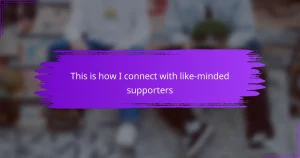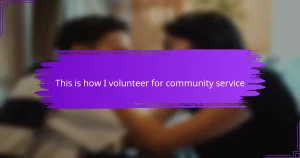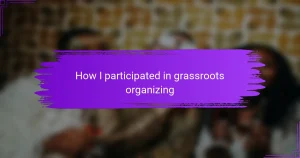Key takeaways
- Policymakers balance political ideologies, public opinion, and long-term consequences, making effective engagement essential for meaningful dialogue.
- The Obama supporter community exemplified the power of grassroots efforts, demonstrating how diverse voices can unite for a common purpose.
- Effective communication with policymakers involves understanding their priorities and tailoring messages to resonate with them, fostering a sense of partnership.
- Persistence and respect in engagement are crucial, as building relationships and trust over time can lead to impactful influence in decision-making.
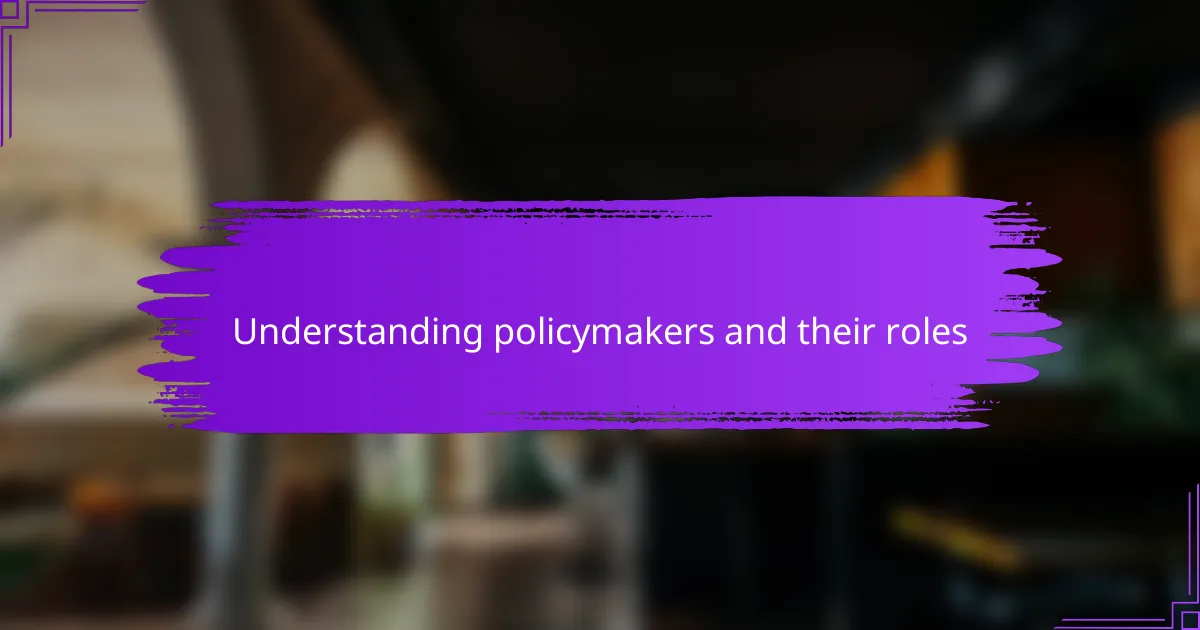
Understanding policymakers and their roles
Policymakers, in my experience, are the backbone of any functioning democracy. They draft, debate, and decide on laws that impact our daily lives, often balancing competing interests under intense pressure. But have you ever paused to think about the sheer complexity behind their decisions?
I’ve noticed that understanding their roles requires more than just knowing their titles; it means appreciating the weight of responsibility they shoulder. These individuals must consider not only political ideologies but also public opinion, expert advice, and the long-term consequences of their actions. It’s a nuanced dance, and sometimes I felt like I was witnessing a masterclass in compromise and strategy.
What struck me most was how accessible policymakers can be when you approach them with genuine questions and respect. It’s easy to see them as distant figures, but my interactions revealed a shared human desire to make a positive difference. Isn’t that what we all want from those who represent us?
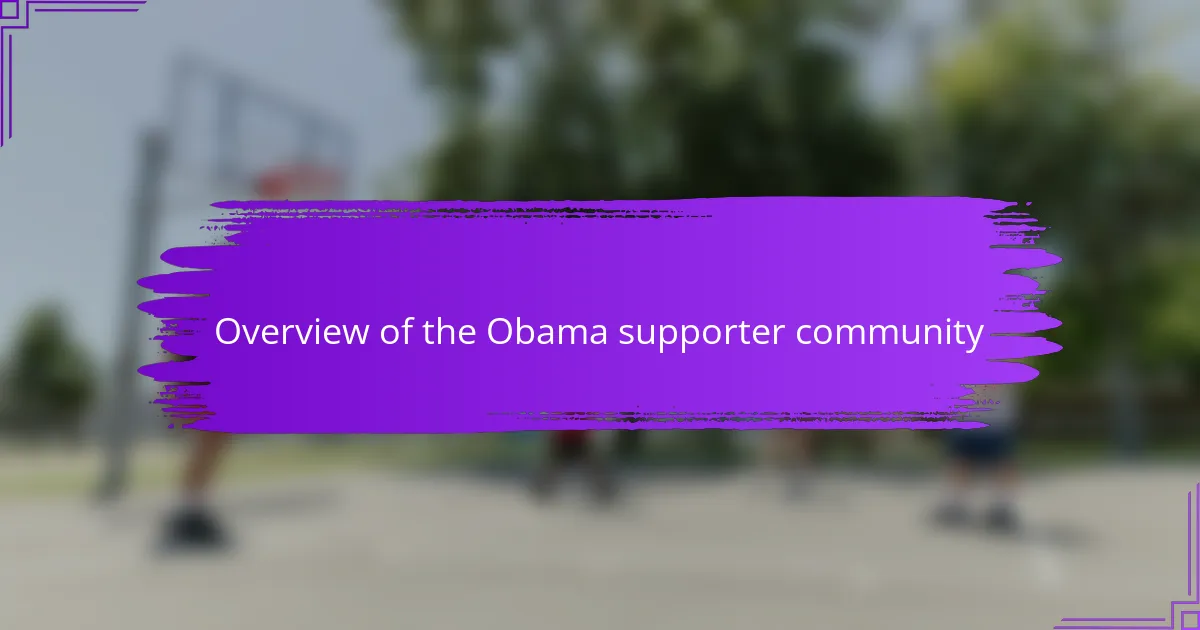
Overview of the Obama supporter community
The Obama supporter community I encountered was unlike any political group I’ve known—vibrant, hopeful, and deeply engaged. It felt like being part of a movement that wasn’t just about one person but about a shared vision for change and inclusion. Have you ever experienced that kind of collective energy that makes you believe real progress is possible?
What stood out to me was how diverse the supporters were, yet united by a common purpose. I met people from all walks of life, each bringing their own story and passion to the table. That sense of unity amidst diversity gave the community its strength and kept the momentum alive, even during tough times.
Joining this community taught me how powerful grassroots efforts can be. It wasn’t just about cheering from the sidelines; it was about conversations, debates, and taking action. I often wondered: could this kind of engagement truly influence policymakers? My experience later showed that it absolutely could.
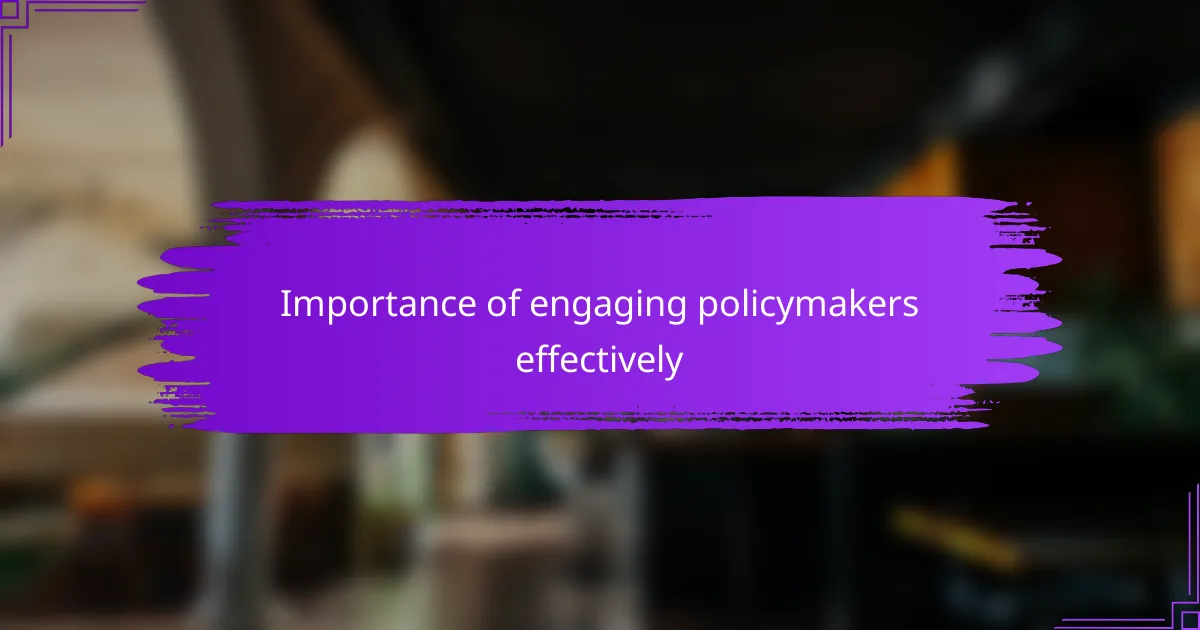
Importance of engaging policymakers effectively
Engaging policymakers effectively isn’t just about voicing opinions—it’s about making your voice heard in a way that resonates. I remember once attending a town hall where simply listening before speaking helped me tailor my message to what truly mattered to the policymakers present. Have you ever noticed how timing and understanding their priorities can turn a casual chat into a real opportunity for change?
From my experience, building relationships with policymakers requires patience and strategy. It’s not enough to show up; you need to connect on shared values and demonstrate how your concerns align with their goals. That approach made my interactions feel less like a confrontation and more like a partnership working toward a common good.
What surprised me the most was seeing how effective communication could break down barriers that seem insurmountable. When I presented well-organized ideas backed by facts and personal stories, policymakers listened—and acted. Isn’t it empowering to realize that engaging thoughtfully can actually influence decisions that shape our communities?
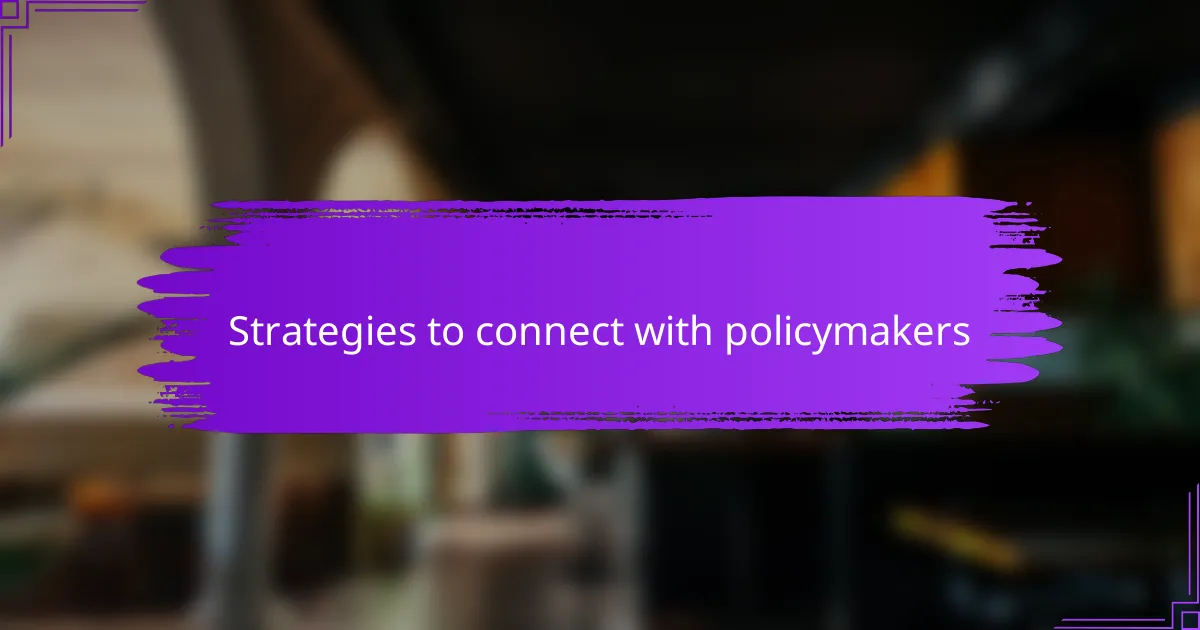
Strategies to connect with policymakers
One of the strategies that truly transformed my experience was doing my homework before reaching out. I found that knowing a policymaker’s background, interests, and recent initiatives allowed me to frame my points in ways that aligned with their priorities. Have you ever tried tailoring your message so it feels less like a petition and more like a shared mission? It makes all the difference.
Another approach I found effective was attending community events where policymakers were present—not just formal meetings but local gatherings or fundraisers. Those casual encounters created opportunities for genuine conversations, breaking down walls of formality. I remember a moment when a simple, sincere question led to a 10-minute discussion that felt more like brainstorming than lobbying.
Finally, I learned that persistence combined with respect is key. Following up after initial contact, whether through a thank-you email or providing additional information, kept the dialogue open without being pushy. Isn’t it encouraging when you see that consistent, respectful engagement can build trust over time, turning acquaintances into allies?
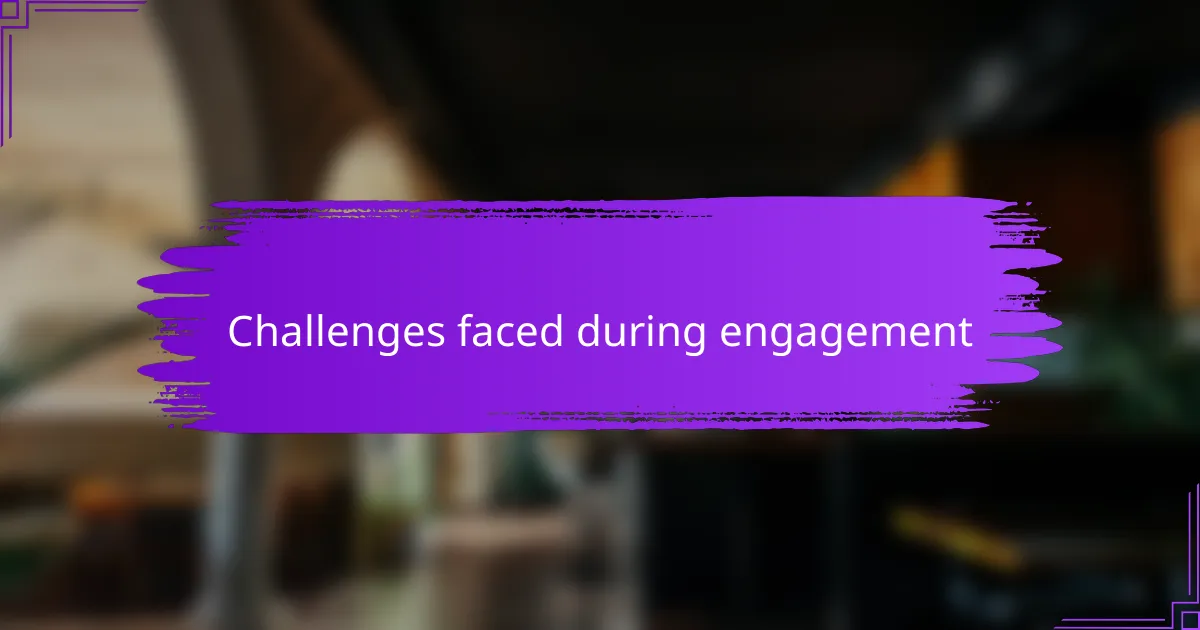
Challenges faced during engagement
There were times when I felt like I was speaking into a void—policymakers are incredibly busy, and breaking through the noise wasn’t easy. Have you ever experienced that frustration of wanting to be heard but feeling sidelined? I often wondered if my words were lost in a sea of competing voices and urgent matters.
Navigating the differing agendas among policymakers was another hurdle. I learned quickly that aligning with one person didn’t guarantee support from others, and balancing those conflicting interests sometimes felt like walking a tightrope. It made me realize how delicate and political the process truly is—and how much patience it requires.
Sometimes, the challenge wasn’t just the policymakers but the system itself. Bureaucratic red tape and formal procedures could slow down progress to a crawl, leaving me questioning if meaningful change could happen quickly enough. Have you ever felt that sense of urgency crushed by layers of protocol? It’s a test of persistence and faith in the process.
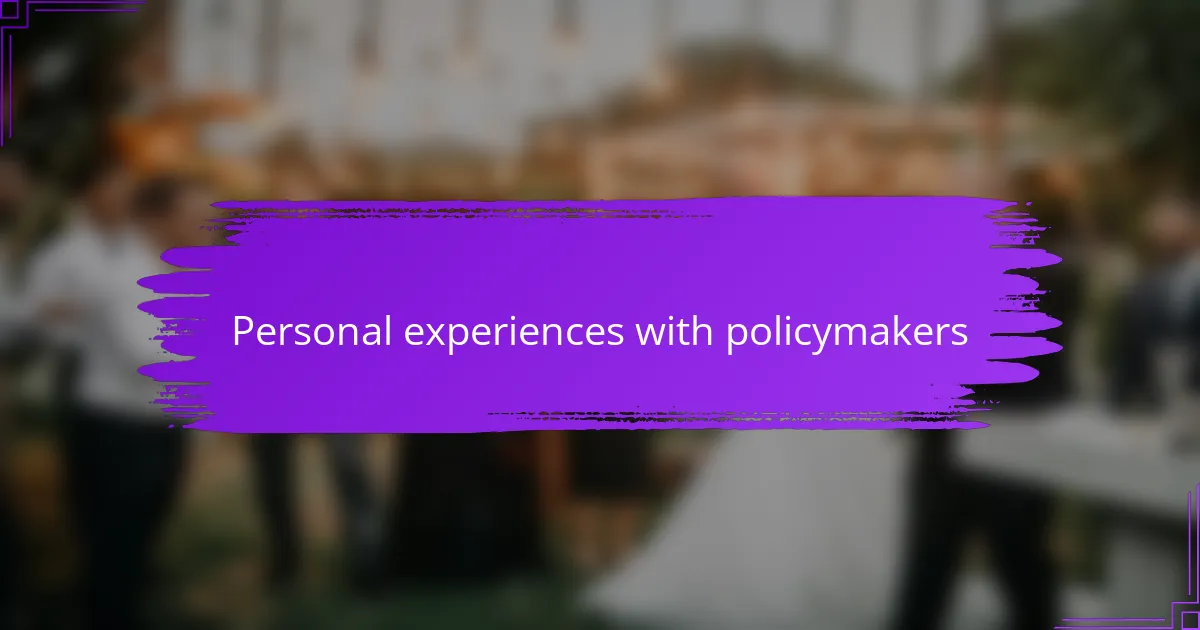
Personal experiences with policymakers
One experience that stays with me was meeting a local representative during a community forum. I was nervous at first, unsure if my concerns would resonate, but as we spoke, I realized how much they valued direct input from constituents. Have you ever been surprised by how a single conversation can shift your sense of empowerment?
In another instance, I shared a personal story about healthcare struggles, and I could see it visibly affected the policymaker. It reminded me that behind every policy debate are real people—and sometimes, that human connection is what truly opens doors. Isn’t it fascinating how empathy can cut through political jargon?
That said, not every interaction was smooth. I recall moments of impatience and feeling overlooked, especially when schedules were tight or priorities clashed. Yet, those challenges taught me the importance of persistence and adapting my approach rather than giving up. What I learned is that meaningful engagement is rarely instant but grows from ongoing effort and respect.
